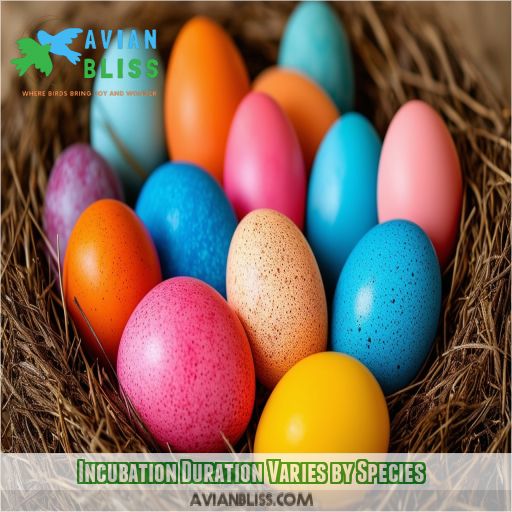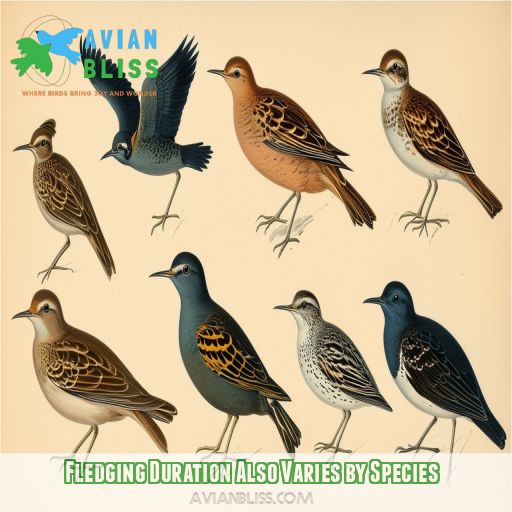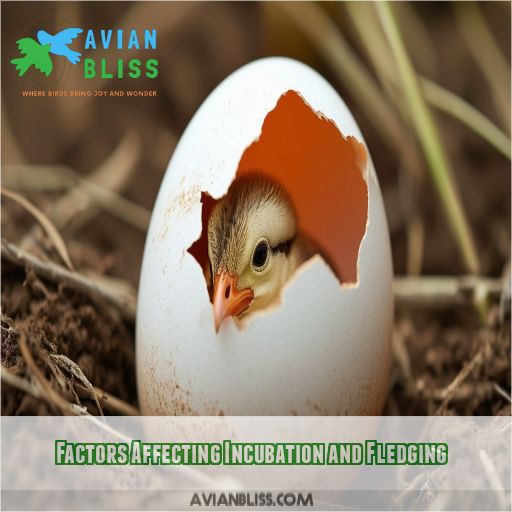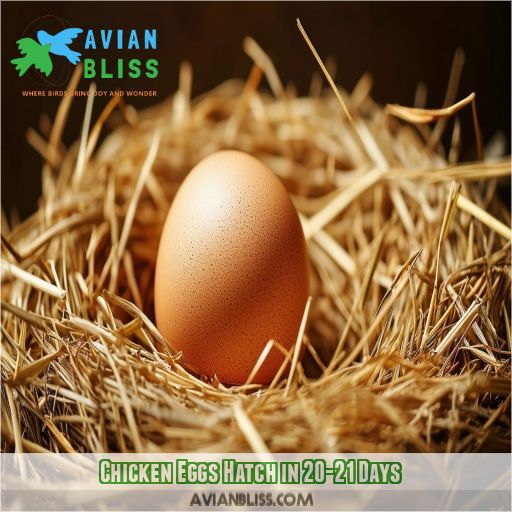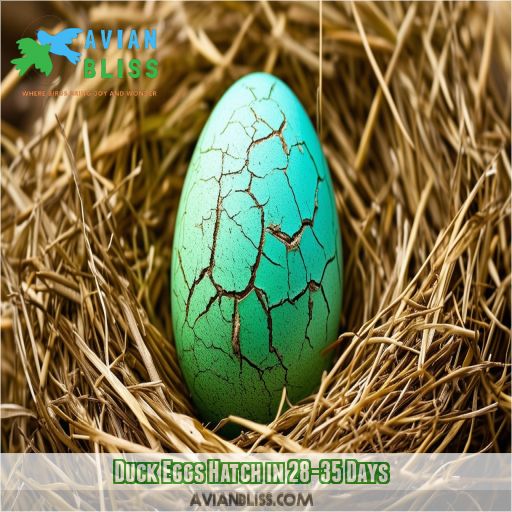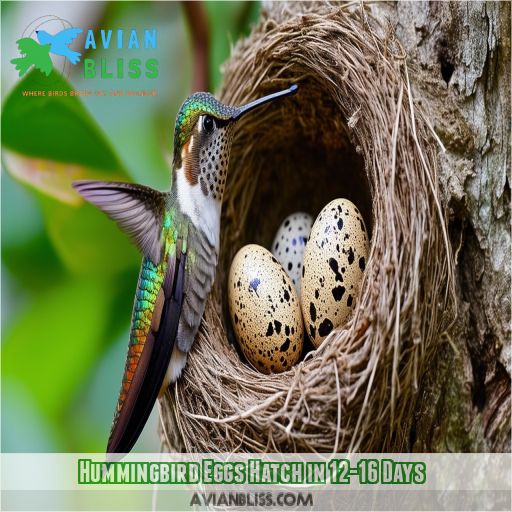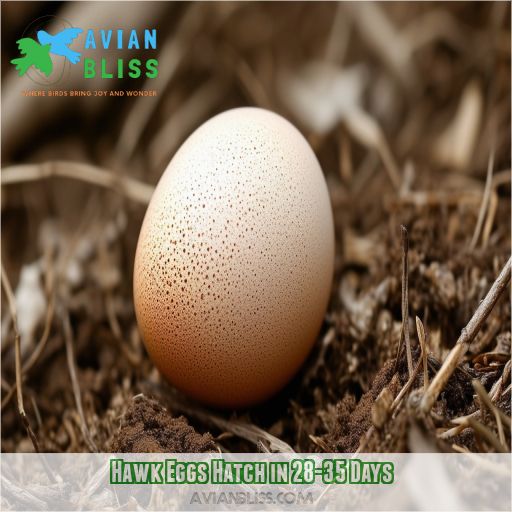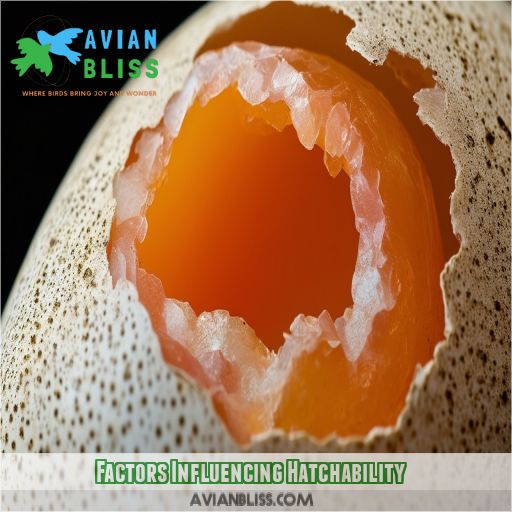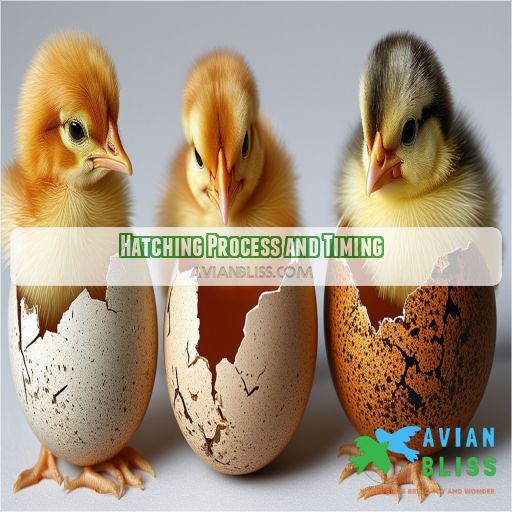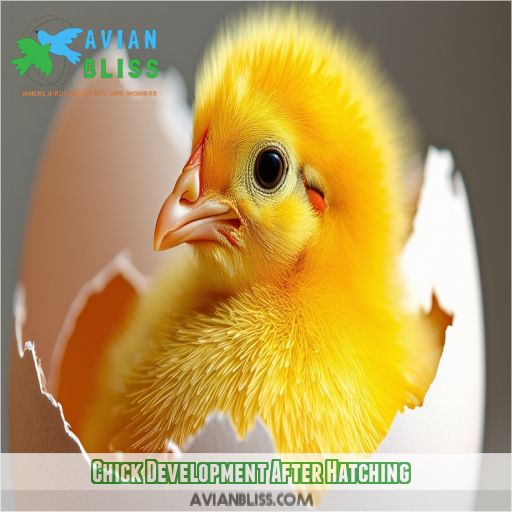This site is supported by our readers. We may earn a commission, at no cost to you, if you purchase through links.
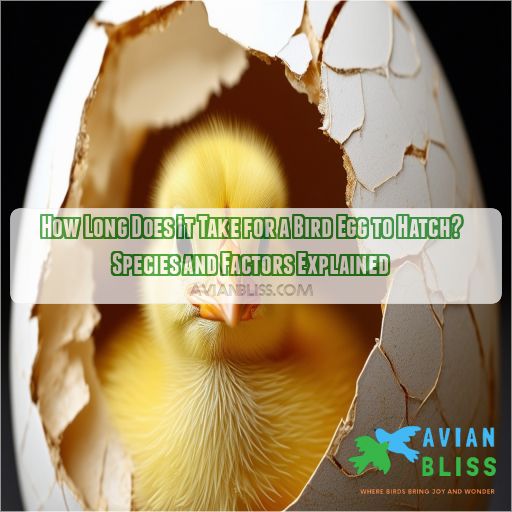
Factors like egg size, nest conditions, and parental care affect incubation duration. Temperature and humidity play important roles, with particular requirements for each species. Proper egg turning and airing are vital for healthy development.
Some birds, like ducks and shorebirds, do not incubate their eggs at all.
If you’re interested in the fascinating world of bird hatching, there’s much more to explore about this incredible process.
Table Of Contents
- Key Takeaways
- How Long Does It Take for a Bird Egg to Hatch?
- Incubation Duration Varies by Species
- Fledging Duration Also Varies by Species
- Factors Affecting Incubation and Fledging
- Chicken Eggs Hatch in 20-21 Days
- Duck Eggs Hatch in 28-35 Days
- Hummingbird Eggs Hatch in 12-16 Days
- Hawk Eggs Hatch in 28-35 Days
- Factors Influencing Hatchability
- Hatching Process and Timing
- Chick Development After Hatching
- Frequently Asked Questions (FAQs)
- How long after hatching do birds leave the nest?
- How long does it take for an egg to hatch naturally?
- Which bird egg hatches the fastest?
- How long do mom birds leave their babies?
- Can bird eggs hatch without a mother?
- Can you move a bird’s nest with eggs?
- How long does it take a bird egg to hatch?
- How long does a hummingbird egg take to hatch?
- How long does it take for an avian to hatch?
- How long does it take a chicken to hatch?
- How does a bird hatch?
- How long does it take a hawk to hatch?
- Can bird eggs hatch without parental incubation?
- How do temperature fluctuations affect egg development?
- What happens if an egg cracks during incubation?
- Can birds tell if their eggs are fertilized?
- Do egg colors influence incubation time or success?
- Conclusion
Key Takeaways
- Bird eggs are nature’s ticking time bombs, with incubation periods ranging from a speedy 10 days for tiny songbirds to a month-long marathon for majestic hawks. Talk about playing the waiting game!
- Size matters in the bird world – smaller eggs hatch faster, while larger ones take their sweet time. It’s like the difference between a microwave meal and a slow-cooked roast.
- Temperature and humidity are the dynamic duo of successful hatching. Get these wrong, and you’ve got yourself a recipe for disaster. It’s a delicate dance of warmth and moisture that would make any meteorologist sweat.
- Parental care is the secret sauce in this excellent adventure. From constant turning to fierce protection, bird parents are the unsung heroes of the animal kingdom. Who knew feathered creatures could give helicopter parents a run for their money?
How Long Does It Take for a Bird Egg to Hatch?
The time it takes for a bird egg to hatch varies widely depending on the species. Generally, smaller birds like songbirds hatch in 10-14 days, while larger birds such as woodpeckers and hawks may take 3-5 weeks to hatch.
Incubation Duration Varies by Species
Regarding hatching bird eggs, the duration varies depending on the species. Small songbirds typically hatch in 10-14 days, while larger birds like woodpeckers may take 3-4 weeks before hatching, with certain birds like ducks, shorebirds, and gamebirds skipping the incubation process altogether.
Small Songbirds: 10-14 Days
As you explore the realm of small songbirds, you’ll find their eggs incubate for 10-14 days, influenced by factors like nest insulation, egg predation, and parental absence, which can impact the delicate hatching cycle.
Larger Birds (woodpeckers): 3-4 Weeks
Larger birds, like woodpeckers, typically have an incubation period of 3-4 weeks. These species use specialized nesting techniques to protect their eggs, with well-insulated nests. Both parents usually play key roles in incubation, ensuring favorable conditions for hatching.
Ducks, Shorebirds, Gamebirds: No Incubation
You’re curious about ducks, shorebirds, and gamebirds, which don’t incubate their eggs. Instead, they leave the nest immediately after hatching, relying on their precocial development to survive.
- Precocial birds are born with open eyes and downy feathers, ready to move around.
- Altricial birds, on the other hand, are helpless at birth and rely on parental care.
- Egg size and weight vary among species, affecting incubation duration.
- Parental roles and nesting strategies also influence incubation behavior.
- Understanding these factors helps you appreciate the unique characteristics of each bird species.
Fledging Duration Also Varies by Species
As you explore the fascinating world of bird egg cycles, you’ll discover that fledging duration – the time it takes for a chick to leave the nest – also varies markedly between species. This critical phase of development is influenced by factors like parental care, food availability, and predation pressure. Here’s a snapshot of fledging durations for different bird groups:
| Bird Group | Fledging Duration |
|---|---|
| Small songbirds | 10-14 days |
| Larger birds (woodpeckers) | 3-4 weeks |
| Precocial birds (ducks, shorebirds) | Immediate or within hours |
| Altricial birds (poultry) | 5-7 weeks |
| Birds of prey (hawks) | 6-8 weeks |
Understanding these variations is essential for appreciating the complex dynamics of breeding, nestling care, and juvenile survival in the bird world.
Factors Affecting Incubation and Fledging
The time it takes bird eggs to hatch varies based on egg size and weight, nest location and insulation, and parental care and feeding (Source). Smaller eggs generally hatch faster, while factors like nest temperature and parents’ attentiveness play key roles in incubation and fledging durations .
Egg Size and Weight
Egg size and weight have a significant impact on incubation and fledging durations. Larger eggs, with greater yolk sizes and volumes, support extended embryo development. Egg porosity, shell color, and shape affect heat and moisture retention, which is essential for maintaining the ideal temperature with rice husks.
Nest Location and Insulation
The location and insulation of the nest are essential to egg development. Key factors include:
- Nest materials: Insulation quality varies with grass, fur, and leaves.
- Nest height: Elevation helps guarantee safety from predators.
- Humidity: Ensures proper embryo development.
Parental Care and Feeding
As you’ve seen, nest location and insulation play a critical role in incubation. Now, let’s explore how parental care and feeding affect incubation and fledging. Proper nest sanitation, chick nutrition, and parental defense are essential, while sibling rivalry and nest sharing can impact a chick’s chances of survival.
Chicken Eggs Hatch in 20-21 Days
Chicken eggs hatch in 20-21 days with appropriate hen selection and egg management, guaranteeing the hen is large, healthy, and vaccinated. Maintaining the correct incubation temperature and humidity levels is essential for maximum hatchability.
Hen Selection and Egg Management
You should select large, healthy, vaccinated hens with a good brooding record for egg collection. Proper egg handling is paramount; gently collect eggs and store them at an ideal temperature. Egg disinfection safeguards egg quality, minimizing the risk of disease. Aim to manage around 14-16 eggs per nest, keeping them accessible to food and water.
Incubation Temperature and Humidity
As you explore incubation temperature and humidity, you’ll discover their critical role in embryo development. For chicken eggs, the ideal incubation temperature is between 99°F and 100°F, with a humidity level of 60-80%. Here are some essential factors to contemplate:
- Invest in superior incubation equipment with accurate temperature control.
- Monitor humidity levels with advanced sensors.
- Establish an egg turning schedule to avert embryo malposition.
- Maintain ideal temperature and humidity levels for 20-21 days.
- Ensure proper embryo development with frequent checks and adjustments.
Duck Eggs Hatch in 28-35 Days
Duck eggs typically hatch in 28-35 days, a period that requires careful management of temperature and humidity for best results. You’ll need to turn and air the eggs regularly to ensure proper development and high hatchability rates.
Artificial Incubation Techniques
Regarding artificial incubation techniques, you’ll need to maintain a stable heat source, such as heated rice or rice husks, and regulate humidity levels between 60-80%. Here’s a summary of the process:
| Step | Description |
|---|---|
| Egg Preparation | Pre-warm eggs to 37-38°C |
| Egg Bundles | 25-30 chicken eggs or 40 duck eggs per bundle |
| Incubation Process | Regular reheating of rice or rice husks, egg turning, and airing |
| Basket Management | Arrange eggs in "new", "in-between", and "old" categories for optimal heat adjustment |
Egg Turning and Airing
To guarantee duck eggs hatch in 28-35 days, regularly turn eggs to prevent yolk settling and optimize development. Maintain eggs at proper temperature and humidity levels. Candling helps track embryo viability, ensuring successful hatching. Proper egg handling and storage are critical, preventing bacteria, and ensuring overall egg viability, essential for effective artificial incubation.
Hummingbird Eggs Hatch in 12-16 Days
Shifting gears from the larger duck eggs, let’s explore the captivating world of hummingbird eggs. You’ll be astonished at how rapidly these tiny wonders mature! Hummingbird eggs hatch in just 12-16 days, a proof of their swift life cycle.
Here are four key factors that affect hummingbird egg incubation:
- Egg size: Minute, about the size of a coffee bean
- Nest location: Well-insulated, often in sheltered tree forks
- Parental feeding: Frequent, high-calorie nectar consumption
- Incubation temperature: Maintained at a warm 96°F (35.5°C)
These tiny powerhouses pack a lot of development into a short time. The female hummingbird’s devotion is remarkable, incubating her eggs alone while maintaining her high-energy lifestyle. As you observe these flying jewels, remember the incredible journey each one undertook from egg to flight!
Hawk Eggs Hatch in 28-35 Days
Hawk eggs take longer to hatch due to their large size and slower embryonic development. During the 28-35 day incubation period, parent hawks provide constant protection and regularly turn the eggs, ensuring even heat distribution and proper development of the growing chicks.
Large Size and Slow Development
You’ll find hawk eggs take longer to hatch due to their large size and slow development. The incubation period typically spans 28-35 days, reflecting significant parental investment. Here’s a breakdown of factors influencing hawk egg development:
| Factor | Impact |
|---|---|
| Egg weight | Heavier eggs require more time |
| Egg shape | Oval shape aids heat distribution |
| Egg color | Darker colors absorb more heat |
| Nestling mortality | Longer incubation may reduce risks |
This extended period guarantees chicks are well-developed upon hatching.
Parental Protection and Feeding
As hawk eggs develop, you’ll notice intense parental care. Both parents fiercely protect the nest, taking turns incubating and defending against predators.
Their feeding behavior is vital for nest success. Once hatched, chicks rely on frequent meals to fuel their rapid growth rate. The parents’ dedication directly impacts brood size and survival.
You’ll see this incredible commitment throughout the entire 28-35 day incubation period.
Factors Influencing Hatchability
The hatchability of bird eggs depends on several key factors that vary among species. These include the specific incubation duration required, precise temperature and humidity conditions needed, and the level of parental care provided during the incubation period.
Species-Specific Incubation Durations
You’ve seen how hawk eggs take longer to hatch. Now, let’s explore species-specific incubation durations. Evolution has shaped diverse strategies:
- Precocial birds hatch ready to go
- Altricial species need more care
- Climate impacts incubation length
- Nesting behaviors vary widely
Temperature and Humidity Factors
You’ll find that incubation temperature and humidity are critical for successful hatching. Birds have evolved impressive thermoregulation strategies and environmental adaptations to maintain suitable conditions. These factors directly impact embryonic development, with even slight variations potentially affecting the hatchling’s survival chances.
Parental Care Variation
You’ll find parental care varies greatly among bird species. Some parents are highly involved, building intricate nests and tirelessly protecting eggs. Others take a hands-off approach. Feeding behaviors and brood size also play essential roles in determining hatchability and chick survival rates.
Hatching Process and Timing
The hatching process begins with internal pipping, where the chick breaks through the air cell inside the egg, followed by external pipping as it breaches the shell. You’ll notice that hatching is timed to coincide with favorable weather conditions and food availability, ensuring the best chances of survival for the newly emerged chicks.
Pipping and Internal Pipping
After absorbing the yolk and calcium, chicks begin pipping. You’ll notice internal pipping first, as they break into the air cell. They’ll use their eggtooth to crack the shell, increasing oxygen uptake while managing water loss. This process signals the imminent hatch.
Emergence From the Egg
You’ll witness a miraculous transformation as the chick emerges from its shell. After weeks of egg development and growth inside, the embryo’s movement intensifies. The yolk sac is absorbed, and external factors trigger the final push. Nature’s clock ticks, signaling it’s time to hatch.
Timing for Optimal Weather Conditions
You’ll find birds time their hatching for ideal weather conditions. They consider food availability and nest location thoroughly. Parental care plays a key role, as does the time of year. It’s a delicate balance, ensuring chicks have the best chance at survival.
Chick Development After Hatching
After hatching, chicks undergo a critical period of growth and development before they’re ready to leave the nest. You’ll observe fledging times varying widely among species, with some birds leaving within days while others remain for weeks, all while adapting to their environment and learning essential survival skills.
Fledging and Leaving the Nest
After hatching, chicks face a critical period of development before leaving the nest. You’ll observe fascinating stages of nestling care and growth:
- Altricial chicks: Born naked and helpless, requiring intensive parental investment
- Precocial chicks: Born with down feathers, able to move soon after hatching
- Sibling competition: Jostling for food and attention in the nest
- Fledgling preparation: Developing flight feathers and muscles for their first venture outside
Survival and Adaptation to the Environment
After fledging, you’ll notice chicks face numerous challenges. Their survival hinges on factors like parental feeding, which is essential for growth.
Egg size influences initial strength, while nest location impacts predator exposure. Temperature and humidity effects continue to play roles in development.
As chicks adapt, they’ll learn to forage, fly, and navigate their environment. It’s a delicate balance of nature and nurture.
Frequently Asked Questions (FAQs)
How long after hatching do birds leave the nest?
You’ll be amazed at how quickly birds grow up! After hatching, most small songbirds leave the nest in just 10-14 days. Larger birds, like woodpeckers, take 3-4 weeks. But ducks, shorebirds, and gamebirds? They’re out immediately!
How long does it take for an egg to hatch naturally?
You’ll find that egg incubation times vary widely among bird species. Small songbirds hatch in 10-14 days, while larger birds like woodpeckers take 3-4 weeks. Ducks, shorebirds, and gamebirds are exceptions, leaving the nest immediately after hatching.
Which bird egg hatches the fastest?
You’ll find the hummingbird’s egg hatches fastest, typically in 11-14 days. These tiny marvels of nature speed through incubation, while larger birds like eagles take up to 35 days. It’s a race against time in the avian world!
How long do mom birds leave their babies?
You’ll find that mom birds’ time away from their babies varies. Small songbirds often leave for 5-30 minutes to feed, while larger species might be gone for hours. It’s a balancing act between nurturing and foraging.
Can bird eggs hatch without a mother?
While nature’s nurturing touch is ideal, bird eggs can hatch without a mother. You’ll need to provide precise temperature, humidity, and turning conditions. It’s a delicate process, requiring careful attention to replicate maternal care.
Can you move a bird’s nest with eggs?
If you notice a bird’s nest with blue eggs, such as those laid by American robins and blue jays, you shouldn’t move a bird’s nest with eggs unless absolutely necessary. It’s illegal for many species and can disrupt breeding. If you must, consult wildlife experts and relocate it nearby, maintaining its original orientation and height.
How long does it take a bird egg to hatch?
Picture an egg as nature’s time capsule. You’ll find incubation periods vary widely among bird species. Small songbirds hatch in 10-14 days, while larger birds like woodpeckers take 3-4 weeks. Some chicks, like ducks, emerge ready to go!
How long does a hummingbird egg take to hatch?
Hummingbird eggs typically hatch in 14-16 days. You’ll find these tiny marvels incubating their pea-sized eggs in walnut-sized nests. It’s a quick process, reflecting the fast-paced life of these aerial acrobats.
How long does it take for an avian to hatch?
Avian hatching times vary widely. You’ll find small songbirds emerge in 10-14 days, while larger birds like woodpeckers take 3-4 weeks. Some species, including ducks and shorebirds, hatch quickly and leave the nest immediately after.
How long does it take a chicken to hatch?
You’ll be waiting an eternity for that chicken to hatch! Typically, it takes 21 days for a chicken egg to incubate and hatch. You’ll need to maintain a consistent temperature of 5°F and proper humidity throughout this period.
How does a bird hatch?
You’ll witness a fascinating process as the chick uses its egg tooth to pip the shell. It rotates inside, chipping away until it creates a circular crack. Finally, it pushes through, emerging wet but ready for life.
How long does it take a hawk to hatch?
You’ll find hawk eggs typically hatch in 28 to 35 days, depending on the species. Larger hawks tend to have longer incubation periods. During this time, parents take turns keeping the eggs warm and protected.
Can bird eggs hatch without parental incubation?
You’ll find that most bird eggs can’t hatch without parental incubation. However, some species, like megapodes, use environmental heat sources. For successful hatching, eggs generally need consistent warmth, humidity, and regular turning to develop properly.
How do temperature fluctuations affect egg development?
You’d be amazed how temperature swings can make or break egg development! Even tiny fluctuations can dramatically impact embryo growth. Too hot or cold, and you’re risking deformities or death. Maintaining a steady temp’s essential for successful hatching.
What happens if an egg cracks during incubation?
If an egg cracks during incubation, you’ll likely lose it. The embryo can dry out or become infected. Small cracks might be salvageable with careful sealing, but it’s risky. Monitor closely and remove if signs of decay appear.
Can birds tell if their eggs are fertilized?
Birds can’t definitively tell if their eggs are fertilized. You’ll notice they’ll incubate all eggs, fertilized or not. Their instinct is to care for the clutch, regardless of fertility status. Only through incubation will viability become apparent.
Do egg colors influence incubation time or success?
Egg colors, nature’s palette, don’t directly affect incubation time or success. You’ll find that factors like species, temperature, and humidity play the key roles. However, darker shells may absorb more heat, potentially influencing the microclimate around developing embryos.
Conclusion
Unveiling the secrets of avian incubation uncovers a world of diversity and precision.
You’ve learned that how long it takes for a bird egg to hatch depends on various factors, from species size to environmental conditions.
Whether it’s the swift 10-day cycle of songbirds or the month-long wait for hawks, each process is finely tuned by nature.
Understanding these intricacies can deepen your appreciation for the remarkable journey from egg to chick, and the indispensable role incubation plays in the survival of bird species.

